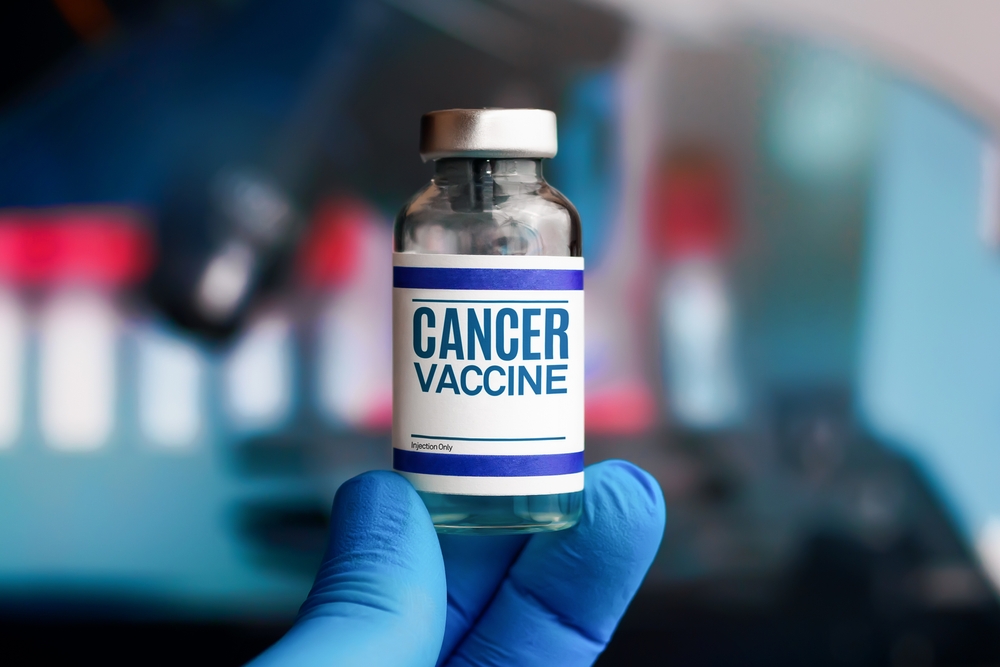Scientists Creating ‘Cancer Vaccine’ That Could Potentially Stop the Disease ‘20 Years Early’

Imagine if you could stop a storm before it ever formed. Not just prepare for it—not just board up windows and brace for impact—but prevent it from ever gathering strength in the first place. For decades, the battle against cancer has been fought in hospitals, operating rooms, and chemotherapy wards—always reacting, always playing defense. But what if we could rewrite that script? What if, instead of treating cancer after it appears, we could train the body to stop it before it ever begins?
Scientists in the UK are working on what could be one of the most groundbreaking medical breakthroughs of our time—a cancer vaccine that may detect and eliminate cancerous cells up to 20 years before they can form a tumor. If successful, this research could shift the very foundation of cancer treatment, turning a disease that has taken millions of lives into something that could one day be preventable.
What Is This Cancer Vaccine?
 Image source: Pexels
Image source: Pexels
For years, cancer has been a silent invader, growing undetected until it reaches a stage where treatment becomes difficult and, in many cases, too late. Scientists at the Francis Crick Institute and University College London are working on a potential breakthrough—a vaccine that could detect and eliminate cancerous cells before they ever have a chance to form a tumor. This isn’t just another treatment; it’s an entirely new approach, shifting the focus from battling cancer after it appears to preventing it decades in advance. If successful, this vaccine could be one of the most significant developments in medical history.
Unlike traditional vaccines that protect against viruses like measles or influenza, this cancer vaccine is designed to train the immune system to recognize early-stage cancer cells and destroy them before they multiply. Researchers are specifically targeting neoantigens—unique proteins that appear on the surface of cancer cells but not on healthy ones. By identifying and attacking these markers, the immune system could be equipped to neutralize cancer before it becomes a threat. This means that high-risk individuals, such as those with a family history of cancer, could receive the vaccine as a preventive measure, drastically reducing their chances of ever developing the disease.
The implications of this research are profound. If the vaccine works as scientists hope, it could completely redefine the way we approach cancer treatment. Instead of relying on chemotherapy, radiation, or invasive surgeries, the body’s own immune system could become the first and most effective line of defense. While the concept is still in development and requires rigorous clinical trials, the idea of stopping cancer years before it starts represents a shift in medicine—one that could save millions of lives in the future.
How Does It Work?
Cancer has always been a master of disguise, hiding within the body’s own cells and avoiding detection until it is too late. This is why traditional treatments like chemotherapy and radiation are often necessary—they attack cancer after it has already gained a foothold. But the vaccine being developed by scientists at the Francis Crick Institute and University College London takes a different approach. It aims to prevent cancer from developing in the first place by harnessing the power of the immune system. Instead of waiting for cancer to grow, this vaccine trains the body to recognize and destroy cancerous cells before they can form a tumor.
At the heart of this breakthrough is the concept of neoantigens—unique proteins that appear on the surface of cancer cells but not on healthy cells. These neoantigens act as red flags, signaling the immune system to respond. The problem is that in many cancers, the immune system either fails to detect these markers or doesn’t act aggressively enough to eliminate them. This is where the vaccine comes in. By introducing these neoantigens into the body in a controlled way, the vaccine effectively “teaches” the immune system to recognize them as threats. This means that if and when the body encounters real cancerous cells, it will already know how to attack and eliminate them, potentially stopping cancer before it ever has a chance to take hold.
What makes this approach so promising is that it could be tailored to high-risk individuals—people with genetic predispositions to cancer, those with precancerous cells, or even those who have previously had cancer and are at risk of recurrence. Instead of undergoing frequent screenings and living in fear of a diagnosis, these individuals could receive a vaccine that offers long-term protection. This could mark a major turning point in medicine, moving away from reactive treatments and toward proactive prevention. However, while the science behind the vaccine is compelling, its effectiveness still needs to be proven in large-scale human trials. If successful, it could represent one of the biggest breakthroughs in cancer prevention in history.
Why This Could Be a Breakthrough in Cancer Prevention
 Image Source: Freepik
Image Source: Freepik
For decades, the medical world has focused on detecting cancer as early as possible, but even with advanced screenings like MRIs, biopsies, and blood tests, diagnosis often comes too late. By the time a tumor is discovered, cancer cells may have already spread, making treatment more complicated and reducing the chances of a full recovery. This vaccine could change that equation entirely—shifting the fight against cancer from detection and treatment to true prevention. Instead of catching cancer early, this vaccine aims to stop it from ever developing, which could save millions of lives and drastically reduce the emotional and financial toll of cancer treatment.
One of the most promising aspects of this vaccine is that it could be particularly beneficial for individuals at high risk of developing cancer. Those with a family history of cancer, genetic mutations like BRCA1 or BRCA2, or conditions that predispose them to cancer might be able to receive the vaccine as a safeguard years before any symptoms appear. Additionally, it could be a game-changer for people who have already survived cancer but fear a recurrence. If this vaccine can effectively train the immune system to recognize and eliminate cancerous cells before they become dangerous, it could significantly reduce relapse rates and offer long-term protection for millions of cancer survivors worldwide.
Beyond individual protection, the impact on healthcare systems could be monumental. Cancer treatment is one of the most expensive and resource-intensive battles in modern medicine, requiring costly hospital stays, chemotherapy sessions, surgeries, and long-term monitoring. If a vaccine can prevent a significant portion of cancers from ever developing, it could free up medical resources, reduce hospital overcrowding, and allow doctors to focus on other pressing health challenges. It would also lessen the personal and financial burden on families, who often struggle with the cost and emotional weight of cancer treatments. This vaccine isn’t just about fighting cancer—it’s about redefining medicine itself, proving that prevention is not only possible but may be the key to finally turning the tide against this disease.
The Journey From Lab to Real-World Use
 Image source: Shutterstock
Image source: Shutterstock
While the potential of this cancer vaccine is groundbreaking, turning scientific discovery into an accessible, life-saving treatment takes time. Right now, researchers at the Francis Crick Institute and University College London are still in the early stages of development. The vaccine has shown promise in laboratory settings and animal studies, but before it can be widely available, it must undergo a series of rigorous clinical trials to prove its safety and effectiveness in humans. This process could take several years, as scientists must ensure that the vaccine not only works but has no unintended side effects.
One of the biggest challenges in bringing a cancer vaccine to the public is the complexity of the disease itself. Unlike viruses, which are caused by external pathogens, cancer is a mutation of the body’s own cells. Each type of cancer—whether lung, breast, prostate, or colorectal—has unique characteristics, which means a single, universal vaccine may not be possible. Instead, researchers may need to develop customized vaccines for different types of cancer or focus on those with the highest genetic risk factors. This is why human trials are critical; they will determine whether the vaccine is effective across different populations and whether it can provide lasting immunity.
Despite these challenges, scientists remain hopeful that this breakthrough could revolutionize cancer prevention. Funding and government support will play a crucial role in accelerating the research, ensuring that if the vaccine proves successful, it doesn’t remain trapped in laboratories but reaches the people who need it most. If the trials go well, experts believe that within the next decade or two, cancer prevention could look drastically different from what we know today. Instead of fearing a future diagnosis, people may be able to get a vaccine that protects them for life—changing the way we think about cancer forever.
What This Means for the Future of Cancer Treatment
If successful, this vaccine could represent one of the most profound shifts in modern medicine—one that moves the world from a reactive approach to cancer treatment toward true prevention. For decades, cancer has been a disease that we fight only after it has taken hold, often requiring aggressive treatments like chemotherapy, radiation, and invasive surgery. These treatments, while life-saving, can be grueling and come with severe side effects. A vaccine that could stop cancer from forming in the first place would change everything, turning what was once a deadly diagnosis into something far more manageable—or even preventable.
The development of this vaccine also raises bigger questions about the future of disease prevention as a whole. If we can train the immune system to recognize and eliminate cancer cells decades before they pose a serious risk, could similar technology be applied to other diseases? Could vaccines be developed to prevent Alzheimer’s, heart disease, or other life-threatening conditions before they start? The implications go far beyond cancer—this breakthrough could open the door to an entirely new way of thinking about healthcare, where the focus shifts from treating disease to stopping it from ever developing.
Of course, challenges remain. Scientific breakthroughs take time, and even if this vaccine proves effective, it may be years before it is widely available. But what this research offers is something more than just another treatment—it offers hope. The idea that we could live in a world where cancer is no longer an inevitable threat, where families don’t have to endure the pain of a devastating diagnosis, and where the next generation grows up knowing that cancer is something we can prevent—this is the kind of future that science is working toward. And if this vaccine succeeds, that future may be closer than we ever imagined.
Featured Image Source: Shutterstock
Loading...






